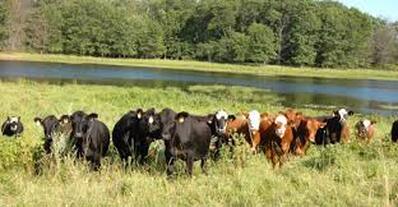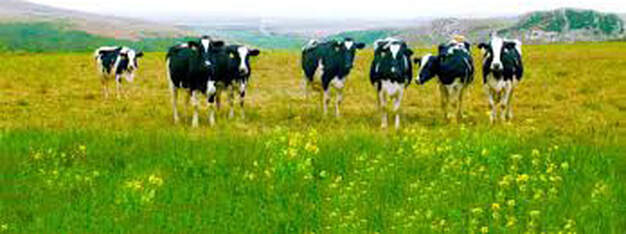Cattle are the no. 1 agricultural source of greenhouse gases worldwide. When cattle eat they produce vast amounts of methane with their digestive processing. Each year a single cow will belch about 220 pounds of methane, which is shorter lived than carbon dioxide but 28 times more toxic in warming our atmosphere. Two cows emit as much greenhouse gas as a 25 mpg car will emit when driven 10,000 miles.

Dairy cattle farmers and cattle ranchers are now joining forces with ocean seaweed farmers to fight climate crisis by cultivating a red seaweed supplement for cattle feed. This additive produces up to a 60 percent reduction in cattle methane emission with just 1 percent of the seaweed in cattle feed. The cattle like it and the cow's milk tastes good with the added algae. It could be a relatively simple solution for reducing emissions.
There is one problem however; producing enough seaweed additive. It can be produced in bioreactors, but producing it in quantities enough for all cattle everywhere is a challenge that scientists are working on. Feeding 100,000 head of dairy or beef cattle a small bit of this seaweed would be the equivalent of taking 50,000 cars off the road.
Another criticism of cattle raising is that it takes up so much land (nearly half of the land in the United States). Overgrazing those lands can degrade soil health and add to climate warming. On the other hand, proper cattle grazing can help mitigate climate change. Environmentally conscious farmers are now maintaining a diversity of native grasses and rotating their herds between pastures to give the cattle plenty to eat but not allowing them to overgraze. This leaves as much grass as possible to allow water infiltration and develop a healthy root system for the grasses. The longer and denser the roots, the more they can hold atmospheric carbon in the soil. While sustainable grazing practices won't completely eliminate methane produced by the cows, they can offset it. According to climate scientists, this solution could sequester 16 gigaton of carbon dioxide by 2050. This is just one example of how we can work together to maintain a healthy planet.

 RSS Feed
RSS Feed